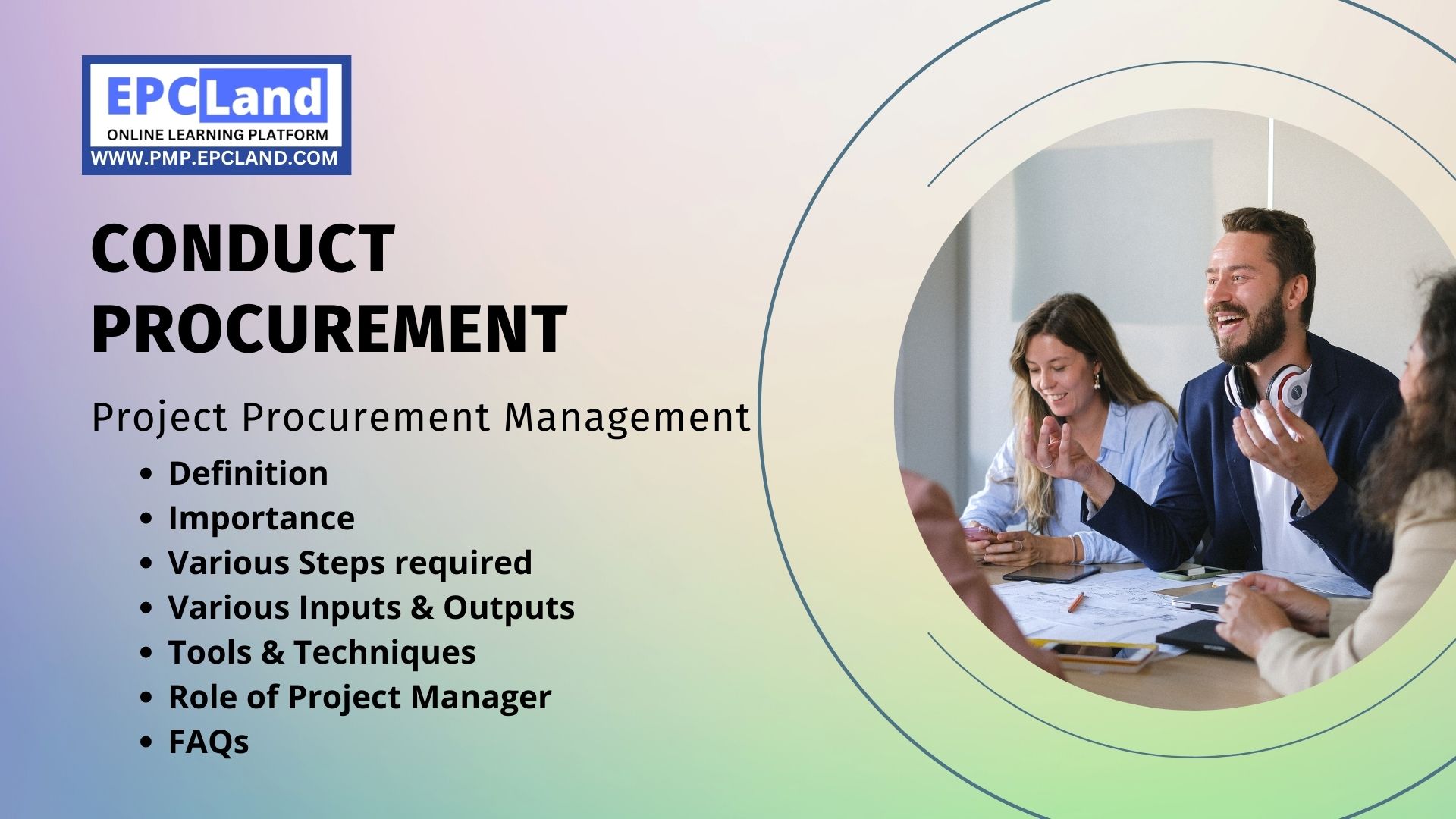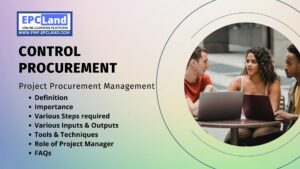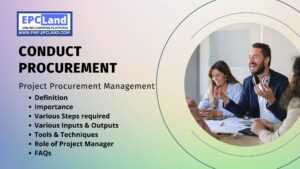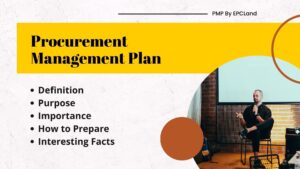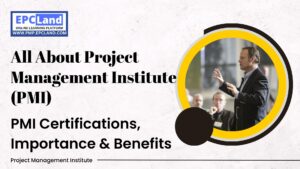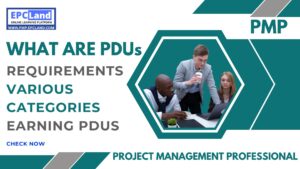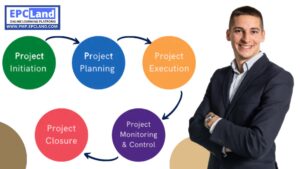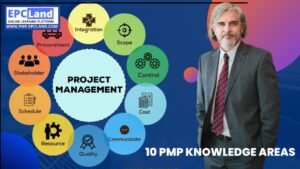Conducting procurement is a critical aspect of project procurement management. It involves acquiring goods, services, and works from external sources to meet the project requirements. An efficient procurement process can help project managers save time, money, and effort while ensuring the successful delivery of the project. A well-structured procurement plan, clear communication with suppliers, and the use of appropriate procurement strategies are key to conducting procurement effectively. This guide will provide an overview of the key elements of conduct procurement, including the importance of professional procurement practices, tips for streamlining the procurement process, and best practices for enhancing procurement outcomes.
What is the Importance of “Conduct Procurement” in Project Procurement Management
“Conduct Procurement” is a critical part of Project Procurement Management and plays an important role in the success of a project. The following are the key reasons for its importance:
- Acquiring resources: Conducting procurement helps project managers acquire the necessary goods, services, and works required to meet project objectives.
- Cost savings: Efficient procurement processes can lead to cost savings by reducing waste, negotiating better prices, and avoiding overspending.
- Time management: Conducting procurement in a timely manner ensures that the project stays on track and that resources are available when they are needed.
- Risk management: Effective procurement management can help reduce the risks associated with procurement, such as late delivery, poor quality, or contractual disputes.
- Stakeholder satisfaction: A well-conducted procurement process can help maintain good relationships with suppliers and other stakeholders, resulting in higher levels of satisfaction.
Attempt Quiz-1 on Conduct Procurement Process
What are the Various Steps required in “Conduct Procurement” in Project Procurement Management
The steps involved in Conduct Procurement in Project Procurement Management are as follows:
- Define procurement requirements: Clearly define the goods, services, and works that are needed for the project.
- Develop procurement documentation: Prepare procurement documentation, such as Request for Proposal (RFP), Request for Quotation (RFQ), and Request for Information (RFI), to solicit proposals from potential suppliers.
- Identify potential suppliers: Identify and evaluate potential suppliers who can meet the procurement requirements.
- Solicit proposals: Send procurement documentation to potential suppliers and invite them to submit proposals.
- Evaluate proposals: Evaluate proposals received from suppliers and select the most suitable one based on a set of criteria, such as cost, quality, delivery, and experience.
- Negotiate contract: Negotiate the terms and conditions of the contract with the selected supplier to ensure that both parties understand their responsibilities.
- Award contract: Award the contract to the selected supplier and document the procurement process.
- Monitor and control procurement: Monitor and control procurement activities to ensure that the goods, services, and works are delivered as per the agreed terms and conditions.
- Close procurement: Close procurement activities when the goods, services, and works have been delivered and accepted by the project team.
What are various Tools & Techniques used for “Conduct Procurement” in Project Procurement Management
The following are some of the Tools & Techniques used for Conduct Procurement in Project Procurement Management:
- Request for Proposal (RFP): A RFP is a document that solicits proposals from potential suppliers and outlines the procurement requirements.
- Request for Quotation (RFQ): An RFQ is a document that requests a quotation from potential suppliers for a specific product or service.
- Request for Information (RFI): An RFI is a document that requests information from potential suppliers about their capabilities and qualifications.
- Source selection criteria: A set of criteria used to evaluate proposals from potential suppliers and select the most suitable one.
- Cost benefit analysis: A cost benefit analysis is a technique used to evaluate the costs and benefits of procurement options and select the most advantageous one.
- Contract negotiation: Contract negotiation is the process of negotiating the terms and conditions of a contract with a supplier to ensure that both parties understand their responsibilities.
- Contract management: Contract management is the process of monitoring and controlling the performance of a contract to ensure that the supplier delivers the goods, services, and works as per the agreed terms and conditions.
- Supplier evaluation: Supplier evaluation is the process of evaluating the performance of suppliers over time to determine their suitability for future procurement activities.
What are various Inputs required for “Conduct Procurement” in Project Procurement Management
The following are some of the inputs required for Conduct Procurement in Project Procurement Management:
- Procurement Management Plan: A procurement management plan outlines the procurement process, including the procurement policies and procedures, the procurement schedule, and the procurement budget.
- Project charter: The project charter defines the scope, objectives, and stakeholders of the project and provides the context for procurement activities.
- Project schedule: The project schedule outlines the timeline for procurement activities and the delivery of the goods, services, and works.
- Procurement statement of work: The procurement statement of work defines the goods, services, and works that are required for the project.
- Source selection criteria: The source selection criteria are used to evaluate proposals from potential suppliers and select the most suitable one.
- Request for Proposal (RFP), Request for Quotation (RFQ), or Request for Information (RFI): Procurement documentation used to solicit proposals from potential suppliers.
- Contract agreement: The contract agreement outlines the terms and conditions of the procurement agreement between the project team and the supplier.
- Performance reports: Performance reports are used to monitor and control procurement activities and to evaluate supplier performance.
What are various Outputs required for “Conduct Procurement” in Project Procurement Management
The following are some of the outputs required for Conduct Procurement in Project Procurement Management:
- Selected supplier: A selected supplier is the supplier that has been chosen to provide the goods, services, or works required for the project.
- Procurement agreement: A procurement agreement outlines the terms and conditions of the procurement agreement between the project team and the supplier.
- Procurement documents: Procurement documents include the Request for Proposal (RFP), Request for Quotation (RFQ), Request for Information (RFI), and other procurement-related documents.
- Contract award notice: A contract award notice informs the selected supplier that they have been awarded the contract and provides the terms and conditions of the contract.
- Work performance reports: Work performance reports are used to monitor and control procurement activities and to evaluate supplier performance.
- Procurement audit reports: Procurement audit reports are used to evaluate the effectiveness and efficiency of procurement activities and to identify areas for improvement.
- Accepted deliverables: Accepted deliverables are the goods, services, or works that have been delivered and accepted by the project team.
What is the role of Project Manager in “Conduct Procurement” in Project Procurement Management
The role of the Project Manager in Conduct Procurement in Project Procurement Management is to oversee and manage the procurement process, ensure that procurement is conducted in compliance with procurement policies and procedures, and ensure that procurement outcomes are aligned with project goals.
Some specific responsibilities of the Project Manager in Conduct Procurement include:
- Developing the procurement management plan: The Project Manager is responsible for developing the procurement management plan, which outlines the procurement process, including procurement policies and procedures, procurement schedule, and procurement budget.
- Soliciting proposals from potential suppliers: The Project Manager is responsible for soliciting proposals from potential suppliers, using procurement documentation such as Request for Proposal (RFP), Request for Quotation (RFQ), or Request for Information (RFI).
- Evaluating proposals: The Project Manager is responsible for evaluating proposals from potential suppliers and selecting the most suitable one, using source selection criteria.
- Negotiating the procurement agreement: The Project Manager is responsible for negotiating the procurement agreement with the selected supplier, outlining the terms and conditions of the procurement agreement.
- Managing procurement activities: The Project Manager is responsible for monitoring and controlling procurement activities, ensuring that procurement is conducted in compliance with procurement policies and procedures.
- Evaluating supplier performance: The Project Manager is responsible for evaluating supplier performance, using work performance reports, and taking corrective action as necessary.
Attempt Quiz-1 on Conduct Procurement Process
FInal Take away on “Conduct Procurement” in Project Procurement Management
Conducting procurement is a critical aspect of project procurement management, as it involves sourcing and acquiring goods, services, or works from suppliers to meet project requirements. A successful procurement process requires careful planning, effective communication, and diligent execution. The Project Manager plays a crucial role in conducting procurement, overseeing procurement activities, and ensuring that procurement outcomes are aligned with project goals. The outputs of procurement, such as selected suppliers, procurement agreements, and accepted deliverables, provide evidence of procurement activities and support ongoing project management activities. Effective procurement management is essential for delivering a successful project outcome.
FAQs on “Conduct Procurement” in Project Procurement Management
- What is Conduct Procurement in Project Procurement Management? Conduct Procurement is the process of sourcing and acquiring goods, services, or works from suppliers to meet project requirements. It involves a series of steps, including planning procurement, soliciting proposals, evaluating proposals, negotiating procurement agreements, and monitoring procurement activities.
- What are the steps involved in Conduct Procurement? The steps involved in Conduct Procurement include:
- Developing the procurement management plan
- Soliciting proposals from potential suppliers
- Evaluating proposals
- Negotiating the procurement agreement
- Managing procurement activities
- Evaluating supplier performance
- What is the role of the Project Manager in Conduct Procurement? The Project Manager is responsible for overseeing and managing the procurement process, ensuring that procurement is conducted in compliance with procurement policies and procedures, and ensuring that procurement outcomes are aligned with project goals.
- What are the inputs required for Conduct Procurement? The inputs required for Conduct Procurement include the procurement management plan, procurement documentation such as Request for Proposal (RFP), Request for Quotation (RFQ), or Request for Information (RFI), and procurement policies and procedures.
- What are the outputs required for Conduct Procurement? The outputs required for Conduct Procurement include the selected supplier, procurement agreement, procurement documents, contract award notice, work performance reports, procurement audit reports, and accepted deliverables.
- What are the tools and techniques used for Conduct Procurement? The tools and techniques used for Conduct Procurement include procurement methods, source selection criteria, negotiations, work performance reports, and procurement audits.
- Why is Conduct Procurement important in Project Procurement Management? Conduct Procurement is important in Project Procurement Management because it involves acquiring the necessary goods, services, or works required to meet project requirements. Effective procurement management is essential for delivering a successful project outcome and ensuring that procurement outcomes are aligned with project goals.
